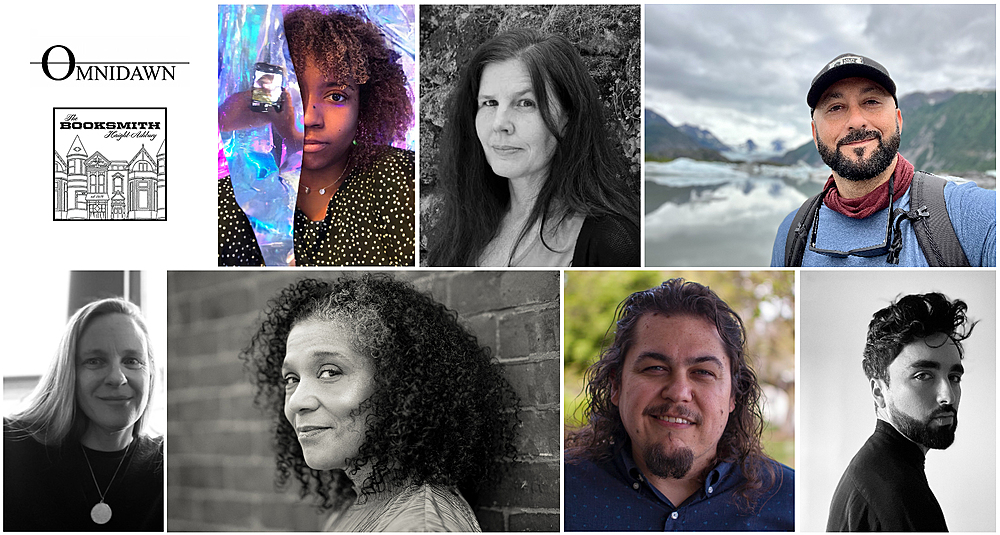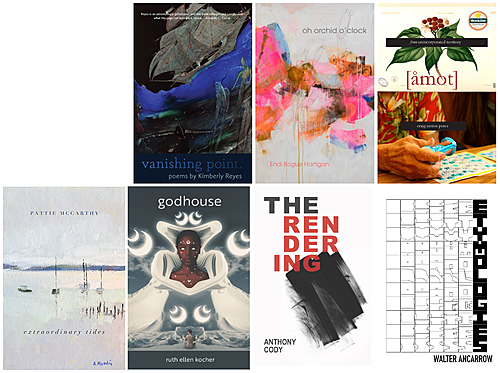Omnidawn Spring '23 Book Launch
Booksmith / Virtual Events
Free Event
No upcoming date/times for this event.

Booksmith is pleased to host a virtual event with Omnidawn Publishing for their seasonal launch of new titles, for which each author will be reading from their work. Be the first to own these new treasures:
vanishing point. by Kimberly Reyes
oh orchid o’clock by Endi Bogue Hartigan
Amot by Craig Santos Perez
Etymologies by Walter Ancarrow
The Rendering by Anthony Cody
godhouse by Ruth Ellen Kocher
extraordinary tides by Pattie McCarthy
This event is free and all ages, but RSVP is required. Event link will be sent to everyone who registers.
About vanishing point. by Kimberly Reyes
Through her latest collection, Kimberly Reyes navigates the physical, hereditary, and liminal worlds between land, time, and memory. The poems in vanishing point. take us to San Francisco, Ireland, and the Atlantic Ocean, reclaiming and examining contested space as the poet seeks to revive left-behind histories, reconsider what we see, and reveal what we cannot see.
Kimberly Reyes is a poet, essayist, and the author of the poetry collections vanishing point. and Running to Stand Still. Her book of essays Life During Wartime won the 2018 Michael Rubin Book Award. Her work has been published in various outlets including the Atlantic, New York Times, Associated Press, Entertainment Weekly, Village Voice, ESPN the Magazine, Film Ireland, Poetry Review, Poetry London, Poetry Ireland, and Best American Poetry Blog. A doctoral student in creative writing at the University of Nebraska, Kimberly spends her time between New York City and Lincoln.
To have vanishing point. sent to your door, order here.
About oh orchid o'clock by Endi Bogue Hartigan
This collection speaks the language of the clock as a living instrument, exposing the sensory impacts of our obsession with time. In oh orchid o’clock, lyrics wind through histories like a nervous system through a body. The poems speak to how we let our days become over-clocked, over-transactional, and over-weaponed. With an instrumental sensibility, Endi Bogue Hartigan investigates what it is to be close to time—collective time, with its alarms and brutalities, and bodily time, intricate and familial. She considers how can we be both captured and complicit within systems of measurement, and she invites us to imagine how to break from, create, or become immune to them. Her poems use language to expose the face of the clock to reveal how gears press against interconnecting systems—economic, capitalist, astronomical, medical, governmental, and fantastical.
Endi Bogue Hartigan is the author of several books, including the poetry and photography chapbook seaweed sd treble clef;Pool [5 choruses], which was selected by Cole Swensen for the Omnidawn Open poetry book prize; and One Sun Storm, which was selected by Martha Ronk for the Colorado Prize for Poetry. Her poetry has appeared in West Branch, Interim, New American Writing, VOLT, Chicago Review, Bennington Review, and Denver Quarterly, among others. She lives in Portland, Oregon.
To have oh orchid o'clock sent to your door, order here.
About Amot by Craig Santos Perez
This book is the fifth collection in Craig Santos Perez’s ongoing from unincorporated territory series about the history of his homeland, the western Pacific island of Guåhan (Guam), and the culture of his indigenous Chamoru people. “Åmot” is the Chamoru word for “medicine,” commonly referring to medicinal plants. Traditional Chamoru healers were known as yo’åmte; they gathered åmot in the jungle and recited chants and invocations of taotao’mona, or ancestral spirits, in the healing process.
Through experimental and visual poetry, Perez explores how storytelling can become a symbolic form of åmot, offering healing from the traumas of colonialism, militarism, migration, environmental injustice, and the death of elders.
Craig Santos Perez is an indigenous Chamoru from the Pacific Island of Guåhan (Guam). He is the co-editor of six anthologies; the author of five poetry collections, including Habitat Threshold; and the author of the monograph, Navigating Chamoru Poetry: Indigeneity, Aesthetics, and Decolonization. He is professor in the English department and an affiliate faculty with the Center for Pacific Islands Studies and the Indigenous Politics Program at the University of Hawai’i, Manoa. He has received the American Book Award, Pen Center USA/Poetry Society of America Literary Prize, Hawai’i Literary Arts Council Award, Nautilus Book Award, and the George Garrett Award for Outstanding Community Service in Literature from the Associated Writing Programs.
To have Amot sent to your door, order here.
About Etymologies by Walter Ancarrow
Walter Ancarrow’s collection Etymologies considers language as a process, rather than as a singular fixed history. These poems build imaginative worlds with a variety of creative word uses. They form a playful amalgamation of linguistic interpretations that flips and questions conventional narratives about word origins—including the idea that clear origins even exist. Throughout the collection, Ancarrow questions the intent of writers who use etymology in attempts to prove a specific meaning for any word. In so doing, Etymologies pays particular attention to relationships between the cultures and conflicts, the migrations and hegemonies, that create our words, and it considers how their meanings are furthered by us as we keep them alive through speech.
Etymologies won Omnidawn’s 2021 Open Poetry Book Prize, selected by John Yau.
Walter Ancarrow lives in New York City and Alexandria, Egypt. His work has been published in Poetry, Tinderbox, Avery Shorts, Folder, Apogee, and American Arts Quarterly, among others.
To have Etymologies sent to your door, order here.
About The Rendering by Anthony Cody
Through a series of experimental poems centered on ecology, Anthony Cody’s The Rendering confronts the history of the Dust Bowl and its residual impacts on our current climate crisis, while acknowledging the complicities of capitalism. These poems grapple with questions of wholeness and annihilation in an Anthropocenic world where the fallout of settler colonialism continues to inflict environmental and cultural devastation. Cody encourages readers to participate in radical acts of refreshing and reimagining the page, poem, collection, and the self, and he invites us to reflect on what lies ahead should our climate continue on its current trajectory toward destruction.
These poems consider if wholeness, or a journey toward wholeness, can exist in the Anthropocene. And, if wholeness cannot exist in these times, we are invited to look at our lives and the world through and beyond annihilation.
Anthony Cody is the author of Borderland Apocrypha, which won the 2018 Omnidawn Open Book Prize, a 2022 Whiting Award, 2021 American Book Award, 2020 Southwest Book Award, 2020 Poets & Writers debut poet, and was a finalist for the National Book Award, the PEN America / Jean Stein Award, and the L.A. Times Book Award, among others. His poetry has appeared in Poetry, Magma, Colorado Review, Gulf Coast, NinthLetter, Prairie Schooner, ctrl+v journal, and TriQuarterly, among others. He coedited How Do I Begin?: A Hmong American Literary Anthology, and he coedited and cotranslated Juan Felipe Herrera’s Akrílica. He serves as poetry editor for Noemi Press and Omnidawn, and he lives with his partner, poet Mai Der Vang, in Fresno, California.
To have The Rendering sent to your door, order here.
About godhouse by Ruth Ellen Kocher (available for pre-order)
Starting with the idea that the human experience is the universe looking back at itself, godhouse takes the notion a few steps further by centering cosmology within a raced and gendered body. Ruth Ellen Kocher’s poems envision this body as a union of god and soul that, within our material world, encompasses love and hate, joy and despair. The body is a site of divine presence made mortal, electrified with the resonance of both the infinite and the human. In godhouse, we encounter the body as a site where the universe is made personal and celebratory, where the celestial endure the complications of flesh and friction forms between the glorious and the monstrous aspects of personhood.
Ruth Ellen Kocher is the author of seven previous books, Third Voice (Tupelo Press, 2016) winner of the PEN Open Book Award, Ending in Planes (Noemi Press, 2014), Goodbye Lyric: The Gigans and Lovely Gun (Sheep Meadow Press, 2014), domina Un/blued (Tupelo Press, 2013), Dorset Prize winner and the 2014 PEN/Open Book Award, One Girl Babylon (New Issues Press, 2003) Green Rose Prize winner, When the Moon Knows You’re Wandering (New Issues Press, 2002), and Desdemona’s Fire (Lotus Press 1999). She has been awarded fellowships from the National Endowment for the Arts, the Cave Canem Foundation, MacDowell, and Yaddo and is a Contributing Editor at Poets & Writers Magazine. She has been named a Distinguished Professor of English at the University of Colorado where she teaches Poetry, Poetics, and Literature.
To have godhouse sent to your door, order here.
About extraordinary tides by Pattie McCarthy (available for pre-order)
Pattie McCarthy’s extraordinary tides occupies a space in the intertidal, the in-between place of not-quite-land and not-quite-sea. The poems reflect on passing time, fluctuating tides, and on our efforts to predict both. Upon a ground that is always in flux beneath us, McCarthy invites us to question if and how we really know where we are. Considering the language of the tides, the poems in this chapbook make a wrackline palimpsest, a seastruck archive, a marginalia of the littoral.
Pattie McCarthy is the author of seven books of poetry, most recently wifthing. A former Pew Fellow, she teaches literature and creative writing at Temple University, where she is a non-tenure track associate professor.
To have extraordinary tides sent to your door, order here.
--
This event is free and all ages, but RSVP is required.
Authors and books are pictured above as listed, clockwise from top left.

